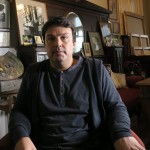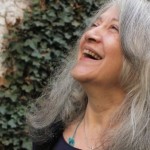Most of the documentaries about the so-called Arab Spring, such as The Square (Egypt) and Tahrir 2011, focus on the political movements themselves in one country. Greg Barker’s engrossing and enlightening documentary, We Are the Giant gives us the revolution through the voices of three families in three separate countries.
The film shows us the courage and sacrifice ordinary people are capable to secure freedom, and asks if peaceful protest can be the answer when repressive regimes begin to kill innocent citizens. Like Martin Luther King and Nelson Mandela, all three families have found that the price of making a stand for freedom is high.
Osama Ben-Sadik talks to the camera with tears welling up in his eyes. Despite his first name, Ben-Sadik is a Libyan-American whose family lives in Virginia and Benghazi and loves the USA. But after hearing about Tunisia’s and Egypt’s Arab Spring movements, when it became Libya’s turn, Ben-Sadic’s handsome, 21-year-old son Muhannad joined the protests. When they turned violent, Ben-Sadik went to Benghazi to beg his son to return to Virginia. ‘If everyone leaves,’ he answered, who will fight for the revolution?’
Given a few minutes of training with an old shot gun, Muhannad was sent off to the front line, proving himself a hero. Stirred by his son’s courage, Ben-Sadik decided to join his son as a driver, supporting the fighters.
Syrian activists Motaz Murad and Ghassan Yassin believe in peaceful protest. Violence only begets violence and one cannot win going up against an enemy with powerful weapons. They are the home-grown original, rational, secular protesters against Assad’s dictatorship who wanted democracy and peace.
We know little about the Bahraini uprising, perhaps because the USA, at least, are allies of Bahrain, using the country as its base in the Persian Gulf. Barker’s opens our eyes and minds in the longest segment, a moving story of remarkable courage that should be required viewing for Western politicians.
Here, lest you think that only men are freedom fighters, Barker tells the story of two sisters, Zaineb and Maryam, who are the daughters of human rights activist Abdulhadi al-Khawaja. The family were living in exile in Denmark, when the Arab Spring broke in Bahrain. They returned to their homeland to participate in the peaceful demonstrations, inspired by the huge crowds marching in an unprecedented show of unity.
When the regime unleashed the army on its own people, al-Khawaja ordered Maryam home to Denmark to write about what was going on and help drum up support from Europe. He was captured, tortured and imprisoned for life for no more than leading peaceful protests. Maryam went as far as Washington DC, with her father’s story, but quickly realised the challenge of her mission.
Meanwhile, Zainab remained in Bahrain, growing overnight from a cautious single mother of one-year-old Jude, to a heroine who has been arrested several times for staging peaceful protests. We see her being beaten and dragged away as she refuses to run from the scene of peaceful protests. While in prison, she went on a hunger strike to protest her father’s imprisonment. Zainab is now in prison.
As powerful and immediate as the three stories are, however, Barker avoids debate and the hard issues, by giving us likeable, engaging, English speaking people whose actions and motives are not really controversial. We are never in any doubt as to who has the moral high ground. No one here is running off to join ISIS, launder money to buy weapons or marry a fighter to breed more fighters. The people in Barker’s film might be ‘some people’s freedom fighters,’ but no one but the most deranged, defensive dictator could mistake them for ‘someone else’s terrorists’.
Joyce Glasser – MT film reviewer




